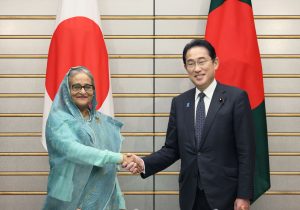Hasina’s trip to the U.S. was limited to meeting officials at the World Bank and the IMF. No official meeting took place between her and the U.S. government.

Credit: Twitter/PM’s Office of Japan
Bangladeshi Prime Minister Sheikh Hasina’s recent 15-day trip to Japan, the United States and the United Kingdom appears to have been made with an eye on general elections that are due in January 2024.
International criticism of her government’s poor record in protecting human rights, democratic backsliding, and a weakening economy have been growing and it is likely that Hasina was hoping that the foreign visits would boost her image and credibility at home.
Hasina’s visits to the three countries came amid increasing strategic competition in the Indo-Pacific between China on the one hand and the U.S. and its allies on the other. It seems that through these visits Hasina was hoping to reduce increasing concern among anti-China sections in Bangladesh that the country was tilting toward China.
On the eve of her departure from Dhaka, Bangladesh’s Foreign Ministry announced the country’s Indo-Pacific Outlook. The outlook is premised upon “friendship towards all, malice towards none” and makes it clear that Bangladesh will not take any sides in the event of a conflict in the Indo-Pacific.
On the security front, the Japanese and Bangladeshi prime ministers pledged to continue mutual visits by vessels and aircraft, unit-to-unit exchange, training programs and goodwill exercises between Japan’s Maritime Self-Defense Forces (JMSDF) and Bangladesh Armed Forces. In addition, both prime ministers have decided to consider opening Defense Wing in Tokyo and National Security Wing in Dhaka in their respective embassies soon.
In addition to deepening its security cooperation with Japan under Official Security Assistance, a new cooperation framework for the benefit of armed forces and other related organizations, Bangladesh said it will welcome defense technology transfer from Japan.
On the economic front, Prime Minister Kishida Fumio assured Hasina that Japan is considering a budget support loan to Bangladesh.
There are two interesting takeaways from Hasina’s Japan trip. First, in the joint statement, Hasina explicitly denounced the Russian invasion of Ukraine as a violation of international law and the U.N. charter. Second, Japan remains silent about Bangladesh’s slide towards autocracy and the serious ongoing violations of human rights in the country.
In contrast to Japan, where Hasina received a high-profile political audience with Emperor Naruhito and Prime Minister Kishida, in the U.S., Hasina’s official trip was limited to meeting with high officials of the World Bank and the International Monetary Fund. No official meeting took place between Hasina and the U.S. government.
Relations between Bangladesh and the U.S. have been strained in recent years. In December 2021, the U.S. government imposed sanctions on Bangladeshi’s elite Rapid Action Battalion (RAB) and a few top security officials, including the current and former Inspector General of Police, for grave human rights violations such as extrajudicial killing and systematic enforced disappearances of opposition activists and critics.
Recently, the U.S. Ambassador in Bangladesh Peter Haas was heckled in Dhaka by a member of the ruling Awami League during his meeting with the victims of enforced disappearances. A few weeks before the U.S. trip, Hasina accused the U.S. of orchestrating a regime change in Bangladesh. Her son, Sajeeb Wazed Joy, who is a U.S. resident and holds an advisory position to Hasina claimed in a Facebook post that the U.S. State Department is full of hypocrites.
In Washington D.C., Hasina joined an event at the headquarters of the World Bank, commemorating 50 years of partnership between the World Bank Group and Bangladesh. At that event, the World Bank pledged to provide Bangladesh with a $2.25 billion loan for five projects relating to connectivity, infrastructure, and sustainable development.
This event was a significant demonstration of a mending relationship between the World Bank and Hasina’s government, which had turned sour in 2012, when the World Bank pulled out of its pledged $1.7 billion loan towards the construction of Bangladesh’s longest bridge over the river Padma on allegations of corruption.
The World Bank’s sudden pull out from the Padma Bridge project pushed Hasina to look elsewhere for funding. Eventually, Bangladesh self-financed the project while a Chinese state-owned company executed it.
Over a decade after the World Bank withdrew from the Padma project and eight months after its inauguration, Hasina gifted World Bank President David Malpass with a painting of the Padma Bridge.
While in the U.K., Hasina attended the coronation of King Charles III and also met British Prime Minister Rishi Sunak. The meeting with Sunak was not official.
How these trips yield results for Hasina will unfold in the months ahead.
It will be interesting to see how her tri-nation visit is received by Russia and China. In the run-up to the visits, Hasina approved a $318 million loan repayment in Chinese yuan to a Russian nuclear power developer to bypass U.S. sanctions on Russia. Bangladesh also obtained a $12 billion loan from Russian for constructing a nuclear power plant in Rooppur. Bangladesh will repay the loan with yuan by using China’s cross border inter-bank payment system.
It is likely that Bangladesh’s growing cooperation with Japan and strong denouncing of the Russian invasion of Ukraine will irk Russia and China.
Hasina’s visits provide evidence of Bangladesh’s persistent efforts to balance between the great powers. How far Bangladesh would be able to push in balancing between the great powers in an era of great divide remains to be seen.
AUTHORS
